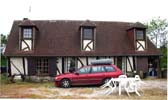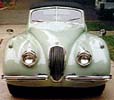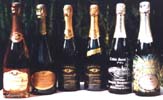



You are here: Home
   |

|
|
You are here: Home |
Getting good ingredientsWe’re pretty fussy about the ingredients we buy, but like everyone else we get lazy and buy meat, fruit and vegetables from supermarkets. Since moving to our village in North Nottinghamshire, we’ve tried to mend our ways a bit. In fact, since reading what Hugh Fearnley-Whittingstall has to say about supermarket meat (below), we hardly ever buy it! Local sourcesWe have monthly Farmers’ Markets in both Worskop and nearby Retford, as well as ordinary ones in both towns every week. Unfortunately our more local one at Worksop seems to be running down, with support from far fewer producers recently, so we now go to Retford on the third Saturday of each month. However, we still go to the ordinary Worksop market on Wednesday mornings, mainly to buy fish from one of the two fish stalls. It was Darren, our fishmonger-of-choice, who recommended Winteringham Fields, where we spent an excellent night in May 2008. Fruit and veg, particularly potatoes for some reason, are a bit hit-and-miss - though very cheap, but Darren always has a good range of fish, including our much-loved Dover sole whenever the price is reasonable. There are also some local farm shops: one on the A57 between Worksop and Junction 31 of the M1 (fruit and veg only), the Arrow Farm Shop on the A619 towards Junction 30 (fruit, veg, meat and all sorts of other stuff, including - sometimes - excellent Belgian mayonnaise) and, a more recent addition, the Welbeck Farm Shop on the A60 Mansfield road between Worksop and Market Warsop. This is quite up-market, more like the Chatsworth Farm Shop in Derbyshire. Both Arrow Farm and Welbeck offer a good range of cheeses, including what used to be my favourite Stilton, Colston Bassett. We have now forsaken this in favour of Stichelton. This is a Stilton-style blue, developed on the Welbeck Estate (one of the old Dukeries hunting estates) but using unpasteurised organic milk (Colston Bassett and the other ’real’ Stilton producers were forced to move to pasteurised after the great Listeria scare involving Edwina Currie), but they did a terrific job, producing cheeses every bit as good as - if a little different from - the originals). Stichelton might best be described as ’Stilton as it used to be’, except that it’s organic. We were lucky enough to visit the shop only a couple of days after Stichelton’s launch early in March 2007. We had a taste in the shop and were genuinely stunned by the quality - rich, creamy and strongly flavoured. Naturally we bought some, and our dinner guests the next day were equally impressed. Some time later, at a Farmers’ Market outside the shop, we met Joe Schneider, who makes Stichelton. He says on his website that the cheese is still under development, but I can’t imagine it getting much better than it is now. Welbeck scores over Arrow Farm for cheeses (for us, at least) mainly because of Stichelton and a beautifully-kept Brie de Meaux, one of my all-time favourites. They also have other favourites of ours: Appleby’s red Cheshire, Kirkham’s Lancashire, Montgomery’s cheddar and Lincolnshire Poacher (next paragraph). However, we still use both shops, choosing carefully between their meats. We have found the beef and lamb at Arrow Farm particularly good - but Welbeck can usually supply calve’s liver (not easy to find) and their plain pork sausages are lovely. Another fairly local cheese is Lincolnshire Poacher. This is a cheddar-style cheese made on a Lincolnshire farm from unpateurised milk - and it shows! The basic cheese is quite excellent, matured for between 14 and 16 months. The Vintage is 18 to 22 months old. We have bought one called Knuckleduster, which isn’t mentioned on the website and was only available at farmers’ markets just before Christmas - I seem to remember that it was three years old! I wonder if this is the same as Double Barrel, which is featured on the site. If so, it’s not to be missed - a cheese with a terrific kick but none of the harshness of some so-called ’mature’ cheddars. At a recent Retford farmers’ market we bought some of the new Lincolnshire Red, a softer, creamier cheese made with vegetable rennet for vegetarians - very nice indeed! Even more local was our village butcher, who had sensational bacon, beef of varying quality (the best absolutely superb) raised on his own farm and a limited choice of pork and lamb which I assumed he bought in. Unfortunately most of his beef went to supermarkets or to his wife’s ’bespoke pie-maker’ shop next door, and he has now closed his shop to concentrate on this side of the business. Fortunately, we have found JT Beedham and Son in Sherwood, Nottingham. It’s a 40-minute trek from home, but well worth it for bacon that makes even our old butcher’s look a bit tame, a fabulous range of sausages and all sorts of meats and salami-type sausages cured, air-dried and smoked on the premises. They’re so good that both Sat Bains and Heston Blumenthal use them! A little further afield is Doncaster market, a proper old-fashioned northern town market with a terrific choice of fish, meat, fruit and veg, but we haven’t really got into the groove of battling the town-centre parking yet! OstrichA regular at Derby, Worksop (until recently) and Retford farmers’ markets is Oslinc, an ostrich farm in Lincolnshire (they do as many as four markets in one day over a very wide area, as you can see here). We’ve been buying their superb meat for some years. It’s dark red, virtually fat-free and - provided you cook it rare - absolutely delicious. If you’re still eating supermarket beef, try this - it’s a revelation! Their burgers are now the only ones we buy. Update 27 March 2009: They now sell online (I’ve just been informed by my old mate Pete Voltarol), so do give this wonderful product a try. For the omelette of a lifetime, you can even get an ostrich egg for a tenner! We usually buy fillet roasts for £7 to £12, depending on size (from £10.40 online). They feed us well and leave enough for an ostrich sandwich (and you won’t know many people who have eaten one of those!). We massage it with olive oil, and season lightly with sea salt and freshly-ground black pepper, then cook it on a ridged cast-iron griddle as hot as we can get it until the outside is well seared and it’s smelling great (more like beef than beef!). Then we slice it into elegant oval slices about a centimetre thick. At this point the centre is dark purple and almost stone-cold, and that’s now I like it. For Patricia I turn the individual slices briefly on the griddle to make them look a bit less gory. Good horseradish sauce or Dijon mustard complement the meat perfectly. This is one of our very regular items for Sunday dinner. Further afieldEvery visit we make back to Derby used to include a call at Barry Fitch’s wonderful butcher shop in Little Eaton, conveniently situated just off the A38 roundabout north-east of the city and therefore right on our route home. Barry is a farmer, slaughterer and butcher - a sadly rare combination in this hygiene-obsessed age. Somehow he’s managed to keep his abbatoir licence, and kills animals from his own and nearby farms. He offers a full range of meat, poultry and game in season, together with an impressive range of ’value-added’ items - cuts wrapped in bacon, stuffed, marinated...you name it! Then there are pork pies, locally-made organic breads. A visit to Barry’s shop tends to be expensive, because it’s an Alladin’s Cave of temptations. He even occasionally sells rosé veal (meat from calves reared properly, suckling as their mothers graze) and - a real rarity because ordinary mortals are squeamish but chefs love it - calves’ liver. A real find at Barry’s was George Stafford Gold Medal Black Pudding, which I used to buy from the late George’s shop in Stanley Common - absolutely the best I ever tasted. I used to drive a minibus full of Brookside boys back from work experience in Ilkeston once a week, and it was my habit to stop at George’s for some black pudding and - to a chorus of ’yuks’ from the lads - eat a link, fresh and cold from the shop, as I drove. A bit of googling following the feedback mentioned above revealed that this delicacy is still available from the shop, now made by the current owner, Richard Chester, using George’s original recipe. There’s no website, but mail order seems to be available: 130 Belper Road, Stanley Common, Derbyshire, DE7 6FQ - phone 0115 932 575. Try some. Finding good meatThe straw that broke my particular camels’ back in this area has been reading The River Cottage Meat Book by Hugh Fearnley-Whittingstall. The first few chapters offer a shocking exposé of meat and poulty farming in Britain, which put us off buying any meat products from the major supermarkets (with the possible exception of Waitrose, which would mean a drive to either Newark or Sheffield). So we decided to eat less meat but good meat. The Meat book is a good starting point, not only for motivation but also for suppliers, of which there is a good list at the back. Most have websites and all will deliver. One, The Ellel Free Range Poultry Company has testimonials from Rick Stein and Michel Roux, chef-patron of the famous Waterside Inn. Fearnley-Whittingstall describes them as the only producers of Poulets de Bresse (France’s finest chickens) in the UK, but it turns out that they are still producing only Sassos chickens. So I ordered two chickens and two guinea-fowl for delivery on the 13 February 2007, because the delivery date for the next kill (no cosy euphemisms here!) turned out to be the very day we’d be at The Fat Duck. At least by then we’d have made a bit more space in the freezer! These arrived on schedule, but the first trials were sadly rather disappointing. Update 21 January 2008: a truly amazing butcher in Nottingham I first heard about JT Beedham & Sons in an article by Matthew Fort on The Guardian’s website, and I knew that they supplied air-dried ham to Sat Bains. I made one attempt to find the shop on the way back from a meeting in the city on the 11 January, but the postcode defeated my Satellite navigation system and I didn’t spot the shop-front because it was actually on the next block from where the GPS had sent me! On the 17 January (on the way to Restaurant Sat Bains for my 65th birthday celebration) I had Patricia as my ’spotter’. I had also got the address, 556 Mansfield Road, from Beedhams’ website, and she spotted the shop as we passed, despite its inconspicuous facade and stair-rods of rain. On the way home the following morning - after hearing about the shop from both Sat and his wife Amanda, we paid the shop a visit. Good move... Links to be investigated The links below are taken from The River Cottage Meat Book. They all tested live on 15 January 2007. The note below each is the result of a brief visit to the site and will be expanded as we look more closely and maybe buy some produce. Not all offer online shopping. The first thought from a brief survey is that the Ellel chickens and guinea-fowl, at £12 and £11 each respectively, are very good value compared with organic poultry. In fact, all the organic meat prices I’ve looked at are pretty scary. As a rough guide to liely costs, I’ve put the suppliers who offer beed rib joints (one I’m interested in because I want to try Heston Blumenthal’s ’Perfect’ Steak’) in ascending order of cost per kilo. Not all non-organic suppliers are cheaper than organic. A number of sites that offer beef only do so in selection boxes or don’t give prices, and several don’t do beef at all.
|
Personal site for Paul Marsden: frustrated writer; experimental cook and all-round foodie; amateur wine-importer; former copywriter and press-officer; former teacher, teacher-trainer, educational software developer and documenter; still a professional web-developer but mostly retired. This site was transferred in June 2005 to the Sites4Doctors Site Management System, and has been developed and maintained there ever since. 
|
|